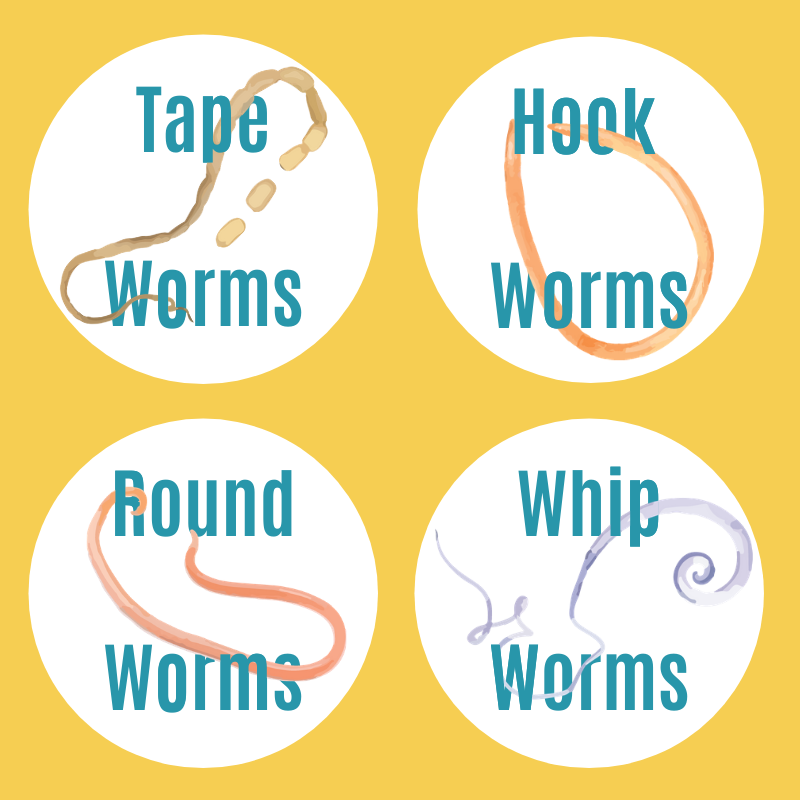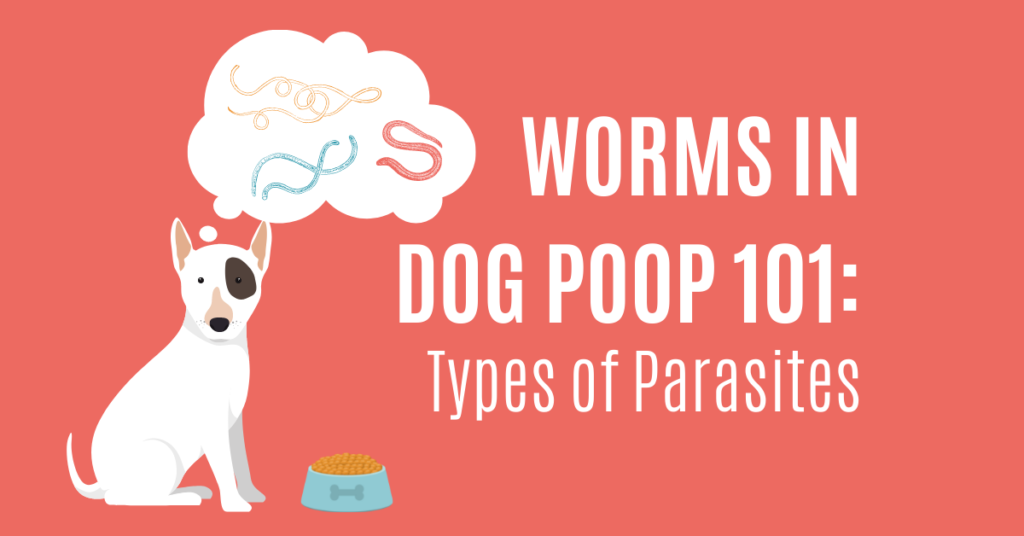Have you ever done a double-take when you saw specs of white rice moving in your dog’s stool or her vomit? Is that really moving? Am I hallucinating? What is that? Are those worms in dog poop?
It can be really terrifying to see your beloved pup infected with a parasite. Seeing your dog ailing is a sight no pet parent would ever like to experience. Since we’ve told you about the different types of dog parasites, it is also necessary for you to dig deep into the world of worms inside dogs. There is a reason that your new puppy will go through multiple rounds of deworming upon birth. Parasitic intestinal worms in dogs are that common. Hookworm, roundworm, tapeworm, and whipworm infections can be as prevalent as 3.24%, 1.95%, up to 60%, and 0.57%, respectively, in dogs. It’s important to note that a lot of these canine intestinal parasites are zoonotic. This means that they can also affect humans. Following proper hygiene greatly reduces this risk.
FUN FACT: Ringworm is not actually a worm! It’s a type of fungus, named for the ring shape on the skin when infected and how it penetrates the skin as a worm would.
4 Most Common Intestinal Worms in Dogs
When dogs eat fecal-contaminated things such as grass, dirt, and water, they can acquire an assortment of intestinal worms. The following are some of the most common intestinal worms in dog poop:
Tapeworm
Tapeworms are the most common type of intestinal dog parasite. There are so many different species. Tapeworms require an intermediate host. This is an animal inside which the tapeworm can grow into its infective life stage. These include fleas, rabbits, fish, and rodents. When your dog eats an infected host, the tapeworm passes into your dog’s intestinal system. Symptoms of tapeworms in dogs include diarrhea, vomiting, dehydration, and weight loss. You may even see small white segments that look like rice in your dog’s poop. These are called proglottids. The proglottids are actually tapeworm segments packed with eggs. They become especially harmful if your dog is active. These can be ingested by other animals and further transmit disease. Interestingly, tapeworms can grow up to a foot long inside of your dog’s intestines!
Hookworm
Hookworm is the next most common type of intestinal worm in dogs. Most dogs get infected with hookworms by ingesting feces-contaminated things. They can also get infected through less frequent methods like:
- the hookworm entering through your dog’s skin/paws via skin penetration, or
- being born to a mother infected with hookworms
Hookworm typically resides in the small intestine. It produces eggs that exit in the feces. If your dog has dark, tar-like diarrhea, or red skin lesions, this may be a sign of hookworm infection. In heavy hookworm infections, anemia and death can happen. This is due to hookworms’ voracious blood-sucking habits. Hookworm infections may result in chronic disease with diarrhea. It is accompanied by hypoproteinemia (low levels of protein in the blood).
Roundworm
Roundworms mainly affect young puppies under the age of one. Roundworms are often the worms seen by people when they’re passed in a dog’s stool or vomit. They’re common in young or recently dewormed dogs. Puppies can get roundworms from:
- their mom’s milk if she is infected, or
- by eating things contaminated with poop (since we know they love to eat everything).
Roundworms affect your dog’s intestinal tract, but they can also enter the bloodstream. If this happens they can get lodged into other organs and tissues. If they reach the lungs, they can be coughed up and swallowed again. If your dog has roundworms, she would present with a potbelly, accompanied by a failure to gain any weight. Roundworms in the environment can mature much quicker in hot environments. Therefore, it is necessary to keep a check on your dog more keenly in summer.
Whipworm
Whipworms get their name by their shape, a thick handle end, and a long, thin whip-like end. In whipworm infections, some dogs may not show any symptoms. Others present with diarrhea with bright blood and mucus in it. Whipworms mainly affect your dog’s large intestine and may not be as damaging as the other types of worms. They can cause weight loss and profuse diarrhea that may be bloody.

Preventing Worms in Dog Poop
It’s better to keep your dog from getting the parasites in the first place. Humans can also contract worms from dogs. Methods for preventing worms in dogs include:
- cleaning up your dog’s poop right away
- regularly disinfecting your dog’s kennels, blankets, beds, etc.
- monitoring your dog when near other potential hosts or feces
- administering prescription preventatives
There are so many different intestinal parasite preventatives on the market. Each gives your dog protection from different types of worms. Below are some of the common preventatives for intestinal worms in dogs:
| Interceptor® | This preventative controls adult hookworms, adult roundworms, and removes whipworm infection. It also prevents heartworm disease. |
| Trifexis® | This preventative functions in controlling roundworms, and preventing whipworm infection and heartworm disease. |
| Simparica Trio® | This multipurpose preventative prevents hookworms, controls adult roundworms, and prevents heartworm disease. Also, it also protects against fleas and prevents infestation of five types of ticks. |
| Sentinel® | This prevents hookworms, roundworms, and heartworm disease. It also prevents the development of flea eggs. |
| Iverhart Max® | This preventative controls hookworms, roundworms, tapeworms as well as heartworm disease. |
| Heartgard Plus® | This controls hookworm, roundworm, and heartworm infections. |
Talk with your veterinarian to decide which preventative is best for your dog.
Testing and Treating for Worms in Dogs
To confirm the presence of worms in dogs, veterinarians will often perform fecal flotation. In this technique, they will ask for a fresh poop sample. They will separate the poop from the potential worms by mixing your dog’s poop with a sugar solution. They’ll wait for the parasite eggs to rise to the top and then look under a microscope to confirm egg presence. Treatment of intestinal worms in puppies may vary on the type of worm infecting your pup. Drontal Plus® and Panacur® may be used to treat worm infections. To treat roundworm and hookworm infections, your veterinarian may suggest:
- Heartgard®
- Interceptor®
- Iverhart Max®
- Sentinel®
- Trifexis®, etc.
Bayer Quad Dewormer® is recommended for cases of tapeworm infection. Even with these options available, the best treatment for intestinal worms in dogs is to prevent them.
Comparison of Common Intestinal Parasites in Dogs
There are various types of dog parasites, especially intestinal worms in dogs. Below is a comparison between the main types of intestinal parasites in dogs

With so many types of intestinal parasites, it’s important to seek veterinary advice. Prevention is your best bet against a costly, time-consuming, and stressful treatment plan.
How often should you worm test your dog?
You should worm test your puppy regularly within their first 12-18 months. An adult dog should have a fecal test 2-4 times per year based on their risk. Whether you find worms in dog poop or you have a suspicion of intestinal parasites are present, you should consult your veterinarian or have a professional examine your dog’s stool for diagnosing the type of infection. We recommend using the free DIG Labs Health Check app. It helps to capture, monitor, and review any stool changes with your veterinarian.
Get the DIG Labs App
Download the free DIG Labs Digestive Health Tracker to get personalized insights and recommendations for your dog based on their stool.

